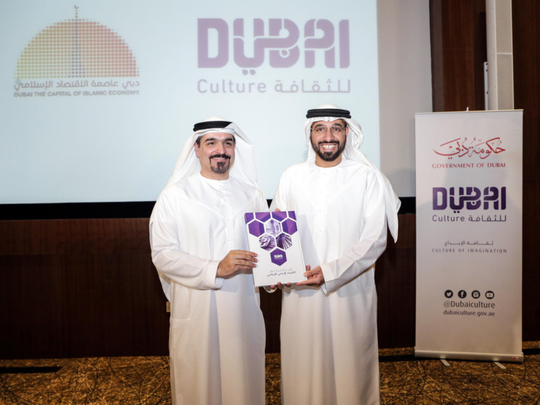
Dubai: Attracting and nurturing people with creative talent, especially the youth, is one of the main pillars to further establish Dubai as a hub for the Islamic economy, a new book suggests.
The book, Global Perspectives on The Islamic Creative Economy, launched on Monday by the Dubai Culture and Art Authority (Dubai Culture), found that this was one of the critical factors that can position Dubai as an international centre for the Islamic Culture and Art Economy (ICAE).
The book, which features interviews that present the opinions of local and international experts, including results from surveys with residents, is an outcome of a one-year research that looked into identifying the Islamic culture and arts economy in Dubai and chart a course for its future expansion, said officials during the public launch of the book at Etihad Museum.
It is also said to support the Dubai Islamic Economy Development Centre, which selected Islamic Lifestyle, as one of the three pillars of its strategy alongside Islamic finance and halal industry.
“The aim of this initiative was to produce a book that explores the role and defines Islamic Culture and Art Economy,” said Arwa Al Qassim, the project manager for the book. “This is the first time a book defines this sector in the economy. It also defines the milestones to achieve in order to reach the vision of His Highness Shaikh Mohammad Bin Rashid Al Maktoum, Vice-President and Prime Minister of the UAE and Ruler of Dubai, to make Dubai the global capital of the Islamic economy.”
Placing them into four main chapters, the book suggests that creating world-class infrastructure, raising public awareness about Islamic culture and art and mobilising funding was also equally important to attracting and nurturing talent.
“These were the four topics that we will have to focus on in our initiatives in Dubai,” said Al Qassim. “We had also carried out a survey with 1,000 residents which saw that people wanted to see more infrastructures, museums, libraries, and galleries. A lot of the start-ups in the Islamic lifestyle said funding was something they also found hard,” she said.
One of the primary challenges to making Islamic culture and art a successful part of Dubai’s role as a global capital of the Islamic economy is the current lack of awareness and engagement from residents, said Dhaen Shaheen, adviser to the chairman of the board of directors at Dubai Culture when pointing out other findings in the book.
“This was something that we found during this project, which means there could be more awareness and more initiatives that can focus on engaging people with Islamic arts and culture,” he said.
During the launch, Saeed Al Nabooda, Acting Director General of Dubai Culture said the newly launched book is a continuation of Dubai Culture’s efforts and reflects their mandate to establish a favourable framework for the creative economy.
“The book supports our leadership’s economic diversification objectives and the vision set out in the Dubai Plan 2021 for a city of happy, creative and empowered people. Since its creation in 2008, Dubai Culture has been dedicated to strengthening Islamic culture and arts both locally and abroad by promoting our heritage sites, contributing to the Islamic coins exhibition at the Islamic Museum of Australia, and touring collections of Islamic calligraphy, poetry and Emirati heritage.”
The book, consisting of 112 pages is written in both Arabic and English and will be available to the public at museums and libraries and is available to download from Dubai Culture’s website.








